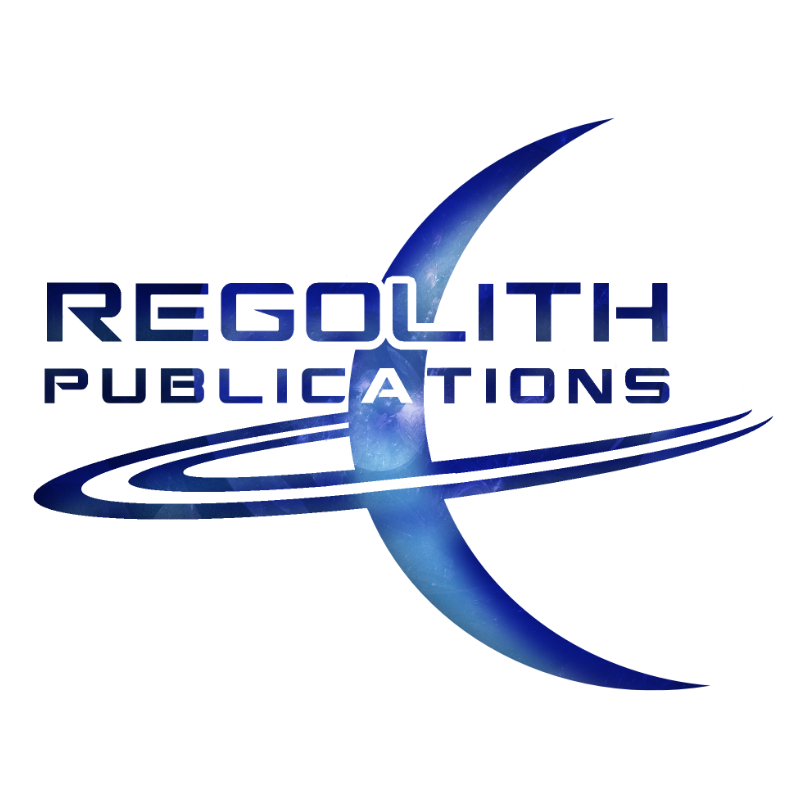|
Robert E. Howard's work on Conan, Krull, and Solomon Kane is often lamented by literary elites as containing too many muscle-bound heroes and deliberate womanizing of scantily clad and nubile young women.
And, to a large degree, this is true. The books do contain a large amount of this kind of sexual exploitation, so to speak. Conan often finds himself in situations where these nubile young women either throw themselves at him or he subdues, seduces, or rescues the woman thereby winning her affection. And it's always just affection and love making. Never is a real romance formed. Essentially, Conan is the stereotypical hero who gets the girl in the end--as one would win a trophy--in most of his stories. It's not hard to see how some might think Howard's writing is dated by the patriarchal views of his day. Sexist, sometimes degrading, views of women characters. But was Howard using this trope because he knew how to write to the pulp market of his day, or did he really think such things about women? It's a mistake for a reader or a critic to believe that the depiction of characters in an author's book reflects the personal beliefs of the author. I mean, with that mindset if you read Howard's "The Frost Giant's Daughter," you might mistakenly believe he was comfortable with the notion of rape. In my personal favorite Conan story, "The Frost Giant's Daughter" the character chases a gossamer-clad goddess across the icy plains of the North, defeats ice giants, and then subdues the girl and tears her clothes off threatening to have his way with her before her deity father intervenes--effectively resetting all time and space and wiping Conan's memory of the event--granted, a much greater violation. Some might consider the story Howard's most risque tale for how close it comes to depicting a scene of rape if they had no capacity to read between the lines, that is. The story is much more nuanced, however. In reading it you'll find that it mainly reads as a metaphor for man's triumph over nature, the gods, and the old way. It also shows that, like Prometheus, Conan's perseverance is never-ending. He literally comes to the brink of madness because he will not give up his pursuit of subduing a literal goddess--which he eventually does. It is a testament to man's free will and of not being dominated by the gods who mock and insult him, where Conan triumphs. He defeats every obstacle the goddess throws at him, including illusions, avalanches, and ice giants. But the story ends with a twist. It is Conan that is robbed of his experience, not the girl. Perhaps it's worth mentioning that Robert E. Howard was the only author to actually get stories starring powerful women published in his day. I'm talking about women protagonists taking the lead and carrying an entire story. Those kinds of stories simply weren't being published in the 1920s. Pulp fiction, it's true, was dominated mainly by masculine, testosterone-charged male heroes, in a seemingly closed-off men's club that didn't allow girls to play. But many of Howard's stories featured strong female leads that were equal to and rivaled their male counterparts. Even Conan played second fiddle on more than one occasion. In "The Queen of the Black Sails" we see Conan become a lowly crew member of an infamous pirate queen, of which the story is about. In "Red Nails," Conan is assisted by the swordswoman, Valeria, who kills nearly everything in sight and is as every bit as deadly as he is. In "The Shadow of the Vulture" Red Sonya makes her literary debut. Event as the story is a historical fiction, Red Sonya is largley a creation of Howard, presumably based off H.p. Lovecraft's wife. An amalgamation of these characters would later lead to the modern version of Red Sonja, who becomes so iconic as to rival even Conan's fame. She has since gained multiple versions of her own comic book series and a big budget Hollywood movie -- all representing the iconic barbarian woman who is just as good with the sword as any man. An archetype encapsulating female strength and beauty is born. Indeed, Robert E. Howard showed complex views with regard to women in a time dominated by outmoded patriarchal views. Dark Agnes de Chastillon had her own ongoing series published in a time where almost no female heroines were being written about in pulp fiction. And this, thanks in a large part, to the imagination and talent that was Robert E. Howard. Post Script Another fascinating article on Robert E. Howard and his views regarding women can be found >>here<<.
1 Comment
I reached out to a talented voice actress and audio book producer via ACX, Amazon's audio book production website, and got a response. My number one pick to narrate and perform Jegra Gladiatrix of the Galaxy said she was interested. I sent out review copies and am eagerly awaiting her response.
I hope she can commit to the project, because this will be the next big step in getting my books to more readers and listeners. "The oldest and strongest emotion of mankind is fear, and the oldest and strongest kind of fear is fear of the unknown." --H.P. Lovecraft
Why do we FEAR that which we don't understand? This is a theme I explore in my series The Chronicles of Jegra: Gladiatrix of the Galaxy. In the prequel story, Origins of the Gladiatrix, my protagonist Jessica Hemsworth is abducted by aliens and taken aboard an alien slave trafficking ship where she is then sold to a bidder who buys her specifically to groom her for the Intergalactic Gladiatorial Syndicate. A galaxy-spanning gladiatorial fighting tournament designed to keep the masses entertained and distracted from the empire building that is subjugating most of them and exploiting their resources. Jessica's fears are mundane at first. She fears being late to work. She fears not being liked by the more beautiful librarian she works with. She fears her curmudgeonly boss who makes sexual advances toward her because he finds her an easy target. Then her life changes. Because she learns what REAL fear tastes like. Being snatched up by aliens is scary enough. Anal probes aside. Jessica simply doesn't have the confidence or experience she needs to deal with the world she's thrust in to. Everything is alien to her. Everything is unknown. When she is headed into a group of aliens, not knowing why, she's so terrified she pisses herself. Not very becoming of our heroine. But this is where things get interesting. She has to make a choice. Does she face the unknown, and persevere? Or does she continue to a coward like she always has done? After she is sold off she is sedated only to wake up hours later in a cage next to other prisoners who are about to be sent into the gladiatorial arena in Arena City on the desert moon Thessalonica. A moon that orbits Dagon Prime, home world to the Lord Emperor Dakroth, leader of the most powerful empire in the galaxy. Before her debut match, however, she is injected with a serum. She believes it to be routine, and she befriends a peculiar satyr named Grendok who gives her some sagely advice on surviving. It turns out the serum she was given modifies her, in real time, and she grows into a She-Hulk sized Amazonian woman who is taller, stronger, with rippling muscles, and a gravity-defying bosom. Meager Jessica Hemsworth giggles at the changes and can't believe her eyes. It's outlandish. Impossible even. And, yet, she continually finds herself in impossible situations. Now that she has the strength of She Ra and Wonder Woman combined, she doesn't fear anymore. She marches onto the field and fights. Like she's expected to. She gets clobbered. Of course, having no experience, but her raw strength ends up saving her. Bloodied and battered, she gets praised by the crowd and gets a newfangled confidence she never had before. The announcer, who cannot seemingly pronounce Jessica, announces her as Jegra, and the rest is history. The Gladiatrix of the Galaxy is born. But even as she becomes more powerful, the various themes of fear seep into every aspect of the story. Jegra's greatest fear is that her friends will be hurt because of her. She is a magnet for a certain kind of violence that continually endangers the safety of those around her. And she realizes this all too late, when her girlfriend, an intersex Dagon woman, chastises her for being reckless in her choices. Our heroine then must face challenge after challenge, including betrayal, imprisonment, isolation, and being powerless to prevent others from harming the people she cares about. Every fear that Jegra has ever had compounds, and she swears to fight until the end to right the wrongs. Because she is the only one who can. This is a big set up, of course, because in the background, a cosmic entity known as H'aaztre has been growing in power. And, eventually, this supernatural being will threaten the fate of the entire galaxy. And the only one powerful enough to stop him, well, I don't want to give away any spoilers. But you can see where the story is headed. My goal in telling this epic space yarn was to play on all the valid fears we have as well as the invalid. An example would be this. Jegra fears for her friend's safety. This is a valid fear we all may experience. Jegra's lover and girlfriend is an intersex transsexual blue-skinned alien woman replete with vestigial, yet still functioning male organs. Jegra discovers that alien species are more diverse in sex and their sexual make up than humans could ever have imagined, and she grows comfortable with the idea that she must choose love above physical attributes. In other words, she has to get over any hang-ups about sex, gender, and sexual orientation and just accept the variety of intergalactic life. After all, we're not dealing with just humans and anthropomorphized alien beings here. So, she has to let go of any irrational fear regarding notions of sex she once may have had. (Surprisingly, many readers cannot and find this aspect of the story grotesque. But, again, highlighting the irrationality of the fear should make them feel equally uncomfortable, and if my books ever have any political agenda it would be to show that love is powerful enough to overcome any irrational fears we may have). In the end, Jegra loves her friends, because they represent the family she never had. They become her home away from home and it’s all she had. The fear of losing them would destroy her. Which is why she fights so hard to keep them safe. Coming out of horror, I wanted to keep a string of tension throughout the series, and I found that through the myth building of my Jegra universe, I was able to weave in a strand of cosmic horror -- a horror of the unknown. The dark void at the end of all time. And the strange tear in space that threatens to eat anything that approaches it. These all tie back to the mythos building of these fantastic alien worlds, the beings that populate them, their cultures, and the ancient religions they practice. Stories only feel believable when they are populated with realistic characters, cultures, and environments, and not having any actual alien worlds to study -- I have to imagine them into existence, and so, I try to paint them with highly detailed characters, cultures, and environments. Everything that lends to a sense of realism. And fear, yes FEAR, is one of the emotions we ALL experience. As such, relying on this primal emotion gives my whole universe a cohesive sense of "it could actually be like this because I've felt this way too" that makes everything else, even outlandish Amazonian warriors with large tits, all the more believable. It's only when I see readers saying that my Jegra series has the best world-building they've ever read, that I know I've succeeded in drawing them in. Not only with the minute details that flesh out the worlds and races in astounding detail, but the emotional realism as well. Jegra book 2, Imperatrix of the Galaxy is now available. So, be sure to check it out if you haven't already. And, as always, feel free to drop a review. Recently, I ran into an interesting publishing problem.
I found that if I put my Jegra book 2, Imperatrix of the Galaxy, into expanded distribution (ExD), I am forced to raise the price of the paperback to meet the minimum royalty requirement for ExD return. But if I raise the price, it takes it up $3 from the $15.99 price I have it at in order to match the pricing of the first book. Now, it's 100 pages more than the first book, so I could totally justify the price hike. The problem is that the Amazon recommended price for a book of my page count shouldn't exceed $17 on the standard paperback pricing chart which Amazon calculates for me automatically. It's a pickle for sure. My solution: Just don't put book 2 into expanded distribution. Yeah, libraries won't be able to order it and certain B&M bookstores, but until I'm selling the same amount of paperbacks as ebooks, the loss is likely minimal. In my estimation, it's better to have an affordable book more people will be willing to buy at a reasonable price (more bang for the buck so to speak), than a book that's priced slightly too high and risk scaring off potential new buyers (cost vs. value). Still, I really have no comparison to draw on, because until I sell a ton more paperbacks I won't know exactly how this affects me. Right now, not very much. Still, I found it interesting enough to share. I've always made it abundantly clear in the *book description* that my books have depictions of sex. Both casual and romantic. The question is, why would I dirty my writing with such banal depictions of human biological copulation? The answer is simple, because to NOT do so would mean my fictions would be fantasies.
Now, you might wonder, what do I mean by that? The truth of the matter is, I find books that avoid broaching the subject of sex all together FAR more fantastical and hard to believe that books that do. Sex is a part of life. In my experience, those who shy away from it do so for personal reasons, most probably because of childhood conditioning where they were never properly informed or made comfortable talking about the subject. But while it's fine to personally find it a topic that you'd wouldn't likely freely discuss, not even in polite company, to assume the rest of the world shouldn't presume to discuss it either is projecting one's own insecurities on an otherwise perfectly normal, and healthy subject matter. The fact that some people find sex repulsive, or, if not that, too intimate to talk about, says more about them than it does the nature of the discussion. Remember, birds do it, bees do it. Even educated fleas, do it. But, I'm not here to try and make you feel like a freak if you have a certain reservation toward something that is natural as eating and breathing -- for what else is the act of sex than our basic instinctual drive to procreate? The problem arises when people realize sex isn't merely a basic instinct and it isn't necessarily about procreation either. That's when people get "weird" about it, so to speak. They feel embarrassed by it. They feel embarrassed watching or reading about it. So, they avoid the topic. I realized early on in my writing carrier that I'd get more readers if I kept my work "clean." That means, without sex. But, I couldn't bring myself to do it. Why? It's too UNREALISTIC. Imagine an epic, sprawling, space opera without ever the hint of romance or sex? Imagine a Starship Enterprise without Captain Kirk's women (a term derived to explain his many promiscuous exploits) or the ever sexually adventurous Commander Riker, with his manspreading, over the chair leg swinging, bravado? Even modern Star Trek has depictions of sex. And, growing up watching Star Trek, I found this gave the series a certain credibility that safer, more kid-friendly science fiction seemed to lack. There's nothing wrong with enjoying stories that don't have sex in them. I enjoy many stories too. Many science fiction films I love don't even broach the subject. Even serious ones. Robocop, Predator, the Matrix. When it comes to literature, however, my favorite works of science fiction do, in fact, contain depictions of sex. Or makes allusions to it. Even Dune, which is fairly clean by nature, has concubine characters, prostitution, and makes references to pedophilia. Nothing is ever depicted in graphic detail, but you get a sense that behind the scenes, the adults are getting jiggy with it. Then there's my recent favorite science fiction series the Takeshi Kovach novels, upon which the Netflix series Altered Carbon was based on. And these books have a ton of sex. The first series, sex played a large theme in the story as well. In the second and third novels, it's there, it seems, just to keep up with the first book and to satiate reader expectation -- for those of us who like to slum it with our dirty imaginations. In my own books you'll find a strange juxtaposition of sex and violence. This is on purpose because we practically revel in violent entertainment. Its so saturated in everything from televised sports to your weekly cop procedural to your Hollwyood blockbuster that people don't even pay attention to it anymore. But if there's a single nip-slip on live broadcast television, everyone loses their mind and the topic is still talked about decades later. You can click on an ad on Facebook that will get you tickets to the next UFC match, follow your favorite fighters, and even see clips of their brutal blood-soaked matches. But if a girl shows even the slightest hint of an areola around a nipple, she has her account shut down and is banned from using Facebook. That's a strange double standard. Why should even the mere thought of sex cause such a knee-jerk reaction in people but brutal violence and gore, that's just fine and dandy? I find it extremely perverse. It may not be my most popular opinion, but I think something is wrong with you if you tolerate one and not the other. If you adhere to that double standard. Which is why I force and equal representation of sex and violence into all my works of fiction. It's there to make people feel uncomfortable on PURPOSE. Maybe they'll ask why? Maybe not. It's also there to add to that realism that, even if we do advance as a species, even is be become physically and mentally evolved beings, we don't stop having sex. Because that would mean the end of our species. And, not only that, but it would make for a very unrealistic story. However, all this is merely to explain why I utilize depictions of sex in my novels. It adds to the realism that brings out the characters and creates interesting interactions and dynamics that wouldn't exist without it. It adds to the layer of realism and also allows me to expose a perverse double standard that is both unfair and irrational. As for others, they may do it for the entertainment value alone, ala Altered Carbon, or they may do it for the realism, ala Dune. Either way, everyone had their own reasons. I was just sharing mine. In Jegra book 2, Imperatrix of the Galaxy, I write different types of sex scenes into it. But, like the first novel, they are tastefully done and each one serves in progressing the plot. If it wasn't part of the plot, and merely exploitative, I'd cut them out. But if you read the first book, Jegra: Gladiatrix of the Galaxy, you'll know the sex scenes are necessary for her character development and (in no small way) serve the plot. And you'll also know by the Christian reviewer that they are tastefully done. Because, as a writer, that's a challenge I enjoy taking on. Getting those who are uncomfortable with the topic to still enjoy the story even if it means having to face a topic that makes them feel vulnerable of slightly uncomfortable thinking about. And, as I stated last time, I fell that, as a writer, it's my responsibility to write worlds where we get beyond the narrow-minded prejudices of today and create a happier world for tomorrow -- one we can aspire to -- together. That's the power as a writer. That's my responsibility as a storyteller. And that's why I write with as much diversity as I do. Whether it comes to the types of characters I write, to their diverse sexualities and genders, to the actual nitty-gritty of the sex. But I try to do it tastefully. I try to do it realistically. And that way, my fictions won't be mere fantasies but will be visions of a future that represent unforeseen possibilities. WHERE TO BEGIN?
Was this a good movie? Meh. Was it a terrible movie? Meh. And that's how the whole film felt. Just... meh. Shane Black managed to craft one of the most mediocre Predator movies to date. That said, it's an excellent action film. Just not what you'd likely expect for a Predator movie. Sure, it has not one, but two Predators! It's got Predator pooches and a ragtag team of sarcastic and quirky soldiers just like the first film. But what it doesn't have is any of the intensity, or scares, or shocking gore that makes the Predator movies, well, Predator movies. That said, I can't hate this film. It's a solid entry into the nearly four decade old franchise. WHAT I LIKED: I enjoyed the fact that Olivia Munn played a smart scientist (I'm a huge Olivia Munn fanboy so I loved the fact she was in this movie, for good or for bad). I liked that an autistic kid was the focus of the Predator's mission. However, I thought it should have been strictly about a fugitive Predator being hunted by an enforcer Predator. And although that's touched on briefly, it wasn't the focus. And, yes, there is a modicum of story development and mythos building this time around, but perhaps not as much as Predators (2010). The reason the Predator wants the child is genuinely interesting, however, and the final scene before the credits (which felt like an after credits scene tacked onto the start of the credits for some reason) opens up the series to go in a totally different direction but, at the same time, felt derivative of another popular Shane Black movie (you'll know exactly what I mean when you see it). Probably the best thing about this film though was that it held my attention from beginning till end. The action was fun, albeit forgettable, and the characters were fun, albeit forgettable. All in all, the film was fun... but... as you could likely guess by my above comments, mostly forgettable. WHAT I DIDN'T LIKE Olivia Munn played the least sexy scientist in the history of sci-fi. Now, don't get me wrong, her character wasn't about being sexy. But she goes from geeky science girl who can barely hold a gun to kick-ass warrior by the end of the film. That made little sense to me. At least make her sexy. I mean, smarts are sexy, but they didn't show much smarts happening. She mostly just ran around a lot. Here's a thought. Show HER outsmart the Predator, maybe. Make her the HERO who saves the boy in the end, not the father. That would be a change of pace. But no. She runs around a lot and doesn't use her sexy-science brain for 99% of the movie. Oh, well. Sexy-but-not-sexy-science lady. She has a three minute long nude scene where you see precisely zero of her naked body. That's fine. I mean, if the actress has a no-nudity clause, hire a body double for goodness sake! Don't spend 3 minutes running around the showers naked, playing cat and mouse, hiding from a Predator, and not show anything below the neck! I get it. I do. We're all about being PC these days, but the scene makes little sense as it was shot, mainly because you have a naked woman running around for 3 minutes and never see below her collar bone. The scene where the Predator does see her in the shower would have been the perfect scene to show full nudity, in a tasteful way. She's crouched down, cowering, and covering herself in the most vulnerable way... and we get a from the neck up shot of Olivia Munn. Seriously? Show her crouching naked! She's still covering herself in the most humble way possible. And that little sex-appeal might have made the movie stand out a bit more for its young male demographic. But you have an intense shower scene that has all the nudity taken out and it becomes like most everything else in this film... forgettable. Speaking of forgettable scenes, many of the action scenes -- apart from the Halloween incident and the big action-packed finale, are all quite forgettable as well. Whereas with the other Predator movies, each time the Predator engages with the human characters of Arnold or Danny Glover, you get a hallmark moment in the movies. Not in this film. The humans just spend the majority of the film running around like stressed out scatterbrained mice. Then at the end they mount a futile attack on the Predators and, well, hey, I don't want to spoil the movie. It's worth the price of admission if you like the Predator franchise and or action-packed sci-fi. But beyond that demographic, maybe wait for rental. In my opinion though, a whole movie about a Predator hunting another Predator should have been just that -- no humans involved. That was the premise that drew me to the film. Two Predators going at it! Why? That's what I wanted to know. And although they answer that question its... well, you guessed it, forgettable. This movie sort of ruins the intrigue of having a good Predator vs. bad Predator by focussing a lot on a supporting cast that, by the end of the film, served their purpose but didn't advance the plot any. Only the boy and his dad soldier seem to have any story to set up at the end for the next installment, if there even is one. And Olivia Munn's kick-ass scientist lady, she managed to get out alive too but by the end sequence the film seems to forget she even exists. Weird. Especially given the thing that happens to that one random scientist dude at the end could have totally happened to her character. It SHOULD HAVE BEEN her character. But where was she? Unavailable for reshoots apparently. FINAL THOUGHTS: This is an aggressively competent action movie but a rather mundane Predator film. It's not the worst in the franchise, but for the massive budget and huge cast they got, I was sort of expecting more from it. A lot more. But it was fun mindless sci-fi, and I guess that's really all you can ask for with a big summer blockbuster. My Predator movies ranking: 1. Predator (still the best) 2. Predators (Better than 2 but just barely) 3. Predator 2 (A solid flick, urban jungle rather than literal jungle) The Predator (Sorry, already forgot what this was about) AVP 1 (all around bad) AVP 2 (Just no) My daughter asked me why the majority of my heroines are lesbian and/or bisexual. I explained to her that I write heroines that embody the essence of the Goddess archetype, and that any ole ordinary mortal man isn't worthy of being with the Goddess.
As such, it compels me to write strong women who avoid the need or even desire for men. If they need companionship, they turn to other women. Unless, of course, the man is exceptionally worthy. But, I added, in my stories the women don't *need* men to get by. She nodded quietly, taking it all in. She's only 8 and hasn't read any of my books but has often asked what story I'm writing so I break down summaries of them for her. She's fascinated by the fact that women can like women and men can like men. She knows that homosexuality is a thing. And she recognizes that it's becoming acceptable in society and was curious as to why I incorporate such things in my stories. I found it to be a rather sophisticated question for an 8-year-old. #proudfather Kurt Vonnegut once said those who had literary degrees made the worst book critics because they were ruined by good taste. LOL But I don't think he's entirely wrong.
A lot of the Indie writers I read I read merely to learn from. I try not to pass judgement on their skill from a literary perspective, because as Vonnegut said, that would simply ruin the experience of engaging with fun stories. A lot of Indie writers rely on raw talent. They haven't necessarily trained in creative writing, storytelling, literary analysis, syntax, or language theory and so just write for the love of it. And this has grown into what we refer today as genre fiction. And there are a ton of excellent genre fiction writers out there in the Indie publishing world. In fact, my Kindle is probably 80% Indie books. From all kinds of genres. Because, although Vonnegut is right in that the literary minded side of me doesn't necessarily consider many of the stories I read good storytelling, I do find a lot of excellent writing. Stuff I couldn't have thought of on my own if I didn't read and engage with Indie writers. I often hear many readers (and some authors) say they only read certain genres. I could never figure out how these people expect to become better writers themselves if they're not willing to expand their mind and learn the tricks of the trade that other writers apply in different genres. I understand having a preference over another, but to say you don't read this or you never touch that because it's not your genre -- well, that's fine if you're a reader. But if you're a writer, then I can't take you seriously. Because a professional in their sport is a professional because they learn it inside and out. And that means studying other forms of storytelling and writing styles. It doesn't mean you have to lock yourself into those styles and techniques, per se. Just learn from them. Study what makes them work. Then incorporate them, or a modified version of them, into your own work as a writer and author. Put a new spin on an old writing trick, for example. This is what Mary Shelley did when she wrote Frankenstein and spawned the science fiction genre. She took the popular gothic ghost stories of the day and incorporated the weariness of modern science being reported in the daily news and meshed them together in a frightening tale of science gone horribly wrong. Granted, we all can't be Mary Shelley. She was a genius writer with a stroke of genius and wrote a genre defining novel one stormy night. But we can aspire to be like Mary Shelley. And as long as we keep pushing ourselves, we keep learning, keep expanding on our set of skills as writers, then we will incrementally get better. My reading preference is non-fiction. In fact, until I started publishing regularly I read almost exclusively non-fiction. Science and physics books mainly. Lots of chemistry. Lots and lots of cosmology. So, I understand having preferences as a reader doesn't usually line up with one's writing. Hey, I write mainly speculative fiction. But I've taken a lot of the information I've accrued over three decades of reading science and have sprinkled it throughout my speculative fiction. And although I've never written straight up hard sci-fi (except for a couple of short stories) I do like to think all my science fiction is rooted in science reality. Even when it's set within a sci-fi fantasy world. That's what reading different genres is like. You can learn to incorporate things you wouldn't have necessarily thought to do because it's not part of the genre you're writing in. You take the best and leave the rest, as the saying goes. And, at the end of the day, hopefully you push yourself to become a better writer. I've improved as a writer immensely since my first book BITTEN. But, when I look back on BITTEN and re-read it, I can be proud that it still holds up. It is still quality. In fact, I wasn't even a big horror guy when I wrote it. I had to read about a dozen zombie books and watch about a dozen zombie films before I even attempted writing it. I needed to learn the vocabulary, the tone, and the style to zombie fiction and horror. But the whole reason I chose to write that book in the first place was to push myself as a writer. To learn a new set of skills. You might say, I was chasing Mary Shelley, in a way. At the time I was researching BITTEN, the Indie market had a zombie fiction boom. That's what pulled me into the Indie world and I haven't looked back since. So, the lesson to take from this? Never limit yourself as a writer. Push yourself to learn new skills, and your writing and storytelling will benefit from it. Don't read just one genre. Read them all. And don't think that just because you learned good taste early on that there isn't something an Indie writer without credentials couldn't teach you. There's always room for improvement. And, since the indie scene often gets a bad rap for its lack of professionalism, I will say this. As someone with a literary background, one of the things that sets the Indies ahead of all the rest is that many Indie writers aren't bound by the literary expectations of the gatekeepers and scholars who decide what is and what isn't quality literature. They can dare to break the rules. And they often do. To great success. I'm currently burning through the Vampire Hunter D novels by Hideyuki Kikuchi even though Vampires aren't really my thing. The novels have a lot more going on in them than vampire lore. They're excellent. And although it far outside my wheelhouse, I'm learning a lot from it. This has been a friendly PSA on writing. My wife suggested that with my talent to write multiple genres, I should write a guide on how I go about tackling each specific genre and how I hit all the tropes of the genre to meet reader expectations. I thought it was a neat suggestion and felt I had something to say about approaching genres, which is different than writing to market, even though there is often overlap between the two. Popular genres, after all, are what sell. So you will see many writers attempting to break into a new genre in order to "write to market" but sometimes they don't know how to stretch themselves when shifting genres. So, taking my wife's advice, I've decided to write a series of short, 80 page, how-to guides on breaking into various genres. Something I have lots of experience with as a multi-genre author.
Many writers don't feel comfortable going outside their own sandbox, so to speak, so these books will be valuable for both aspiring writers wanting to hit a specific genre right out of the gate and for seasoned writers who might be looking to try a new genre. The first three books will focus on Sci-Fi, Fantasy, and Horror. The big three of speculative fiction. The next series will focus on Mystery, Post Apocalyptic / Survival, and Paranormal / Supernatural genres. Above are the cover designs for the first set. Be sure to subscribe to my newsletter for release dates, free samples, and book giveaways! Making her a slave to the arena was their first mistake. Underestimating her will be their last. It's finally here! My grindhouse style space opera, The Chronicles of Jegra: Gladiatrix of the Galaxy! Get ready for 'Red Sonja' in space with a touch of John Carter set in a Star Wars styled universe. Get the Ebook HERE. Get the paperback HERE. #scifi #NewRelease #KindleUnlimited What is it about?Jessica Hemsworth's life was turned upside down the day aliens decided to abduct her and sell her into the Galactic Gladiatorial Syndicate. Now, fighting on the desert moon Thessalonica, she is reborn as JEGRA, Gladiatrix of the Galaxy! When the ruthless Emperor Dakroth of the Dagon Empire falls for Jegra, he decides to make her his new Empress. Before their wedding day, however, the Nyctan enemy fleet jumps into Dagon space and decimates Emperor Dakroth's royal battlecruiser. Now, marooned on the desert moon, he has no choice but to turn to his bride-to-be for survival. Free Prequel NovelBe sure to sign up to my newsletter and get the Chronicles of Jegra prequel novel: Origins of the Gladiatrix of the Galaxy for free!
|
Tristan VickBy day I am an educator and a cultural ambassador. By night I entertain notions of being a literary master. In reality I am just a family man and ordinary guy who works hard and loves writing just about as much as I love my family. Just about. AVAILABLE NOWNEWSLETTER
|
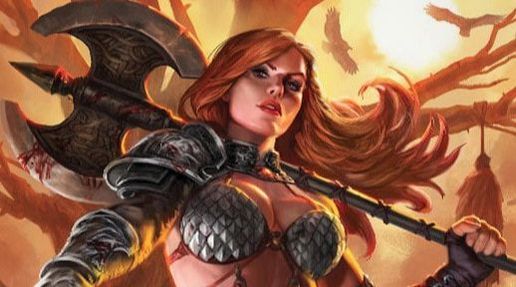
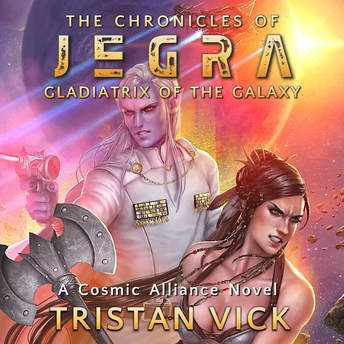
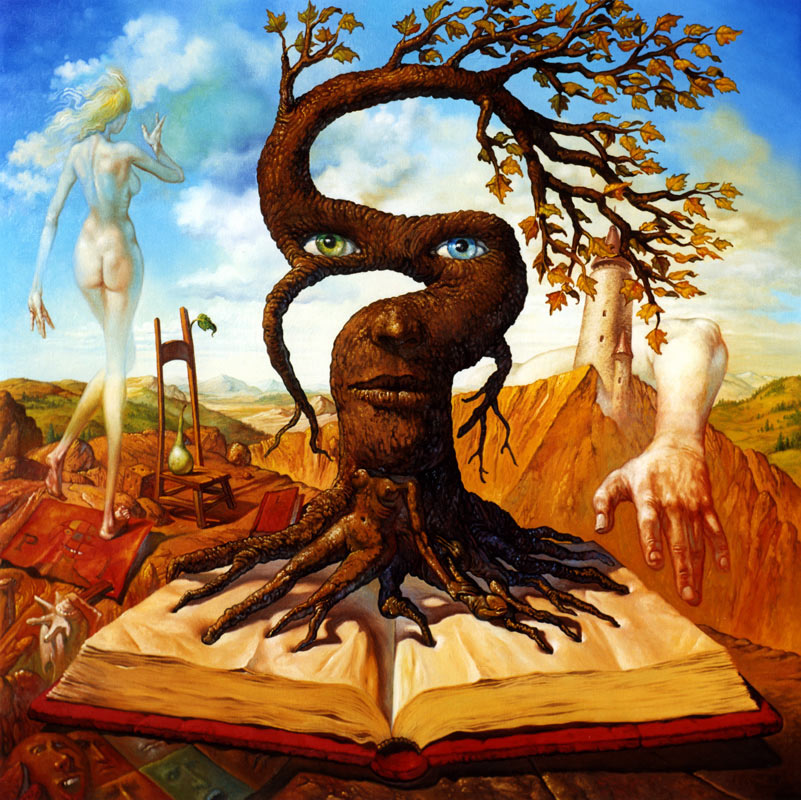
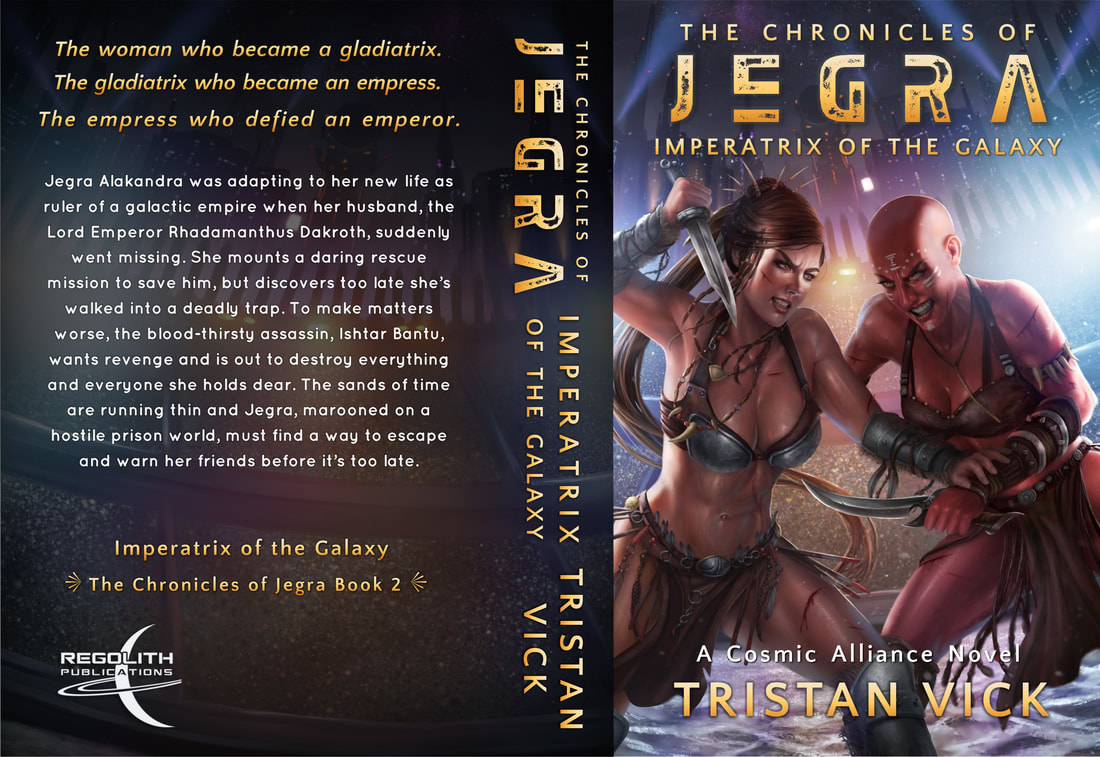
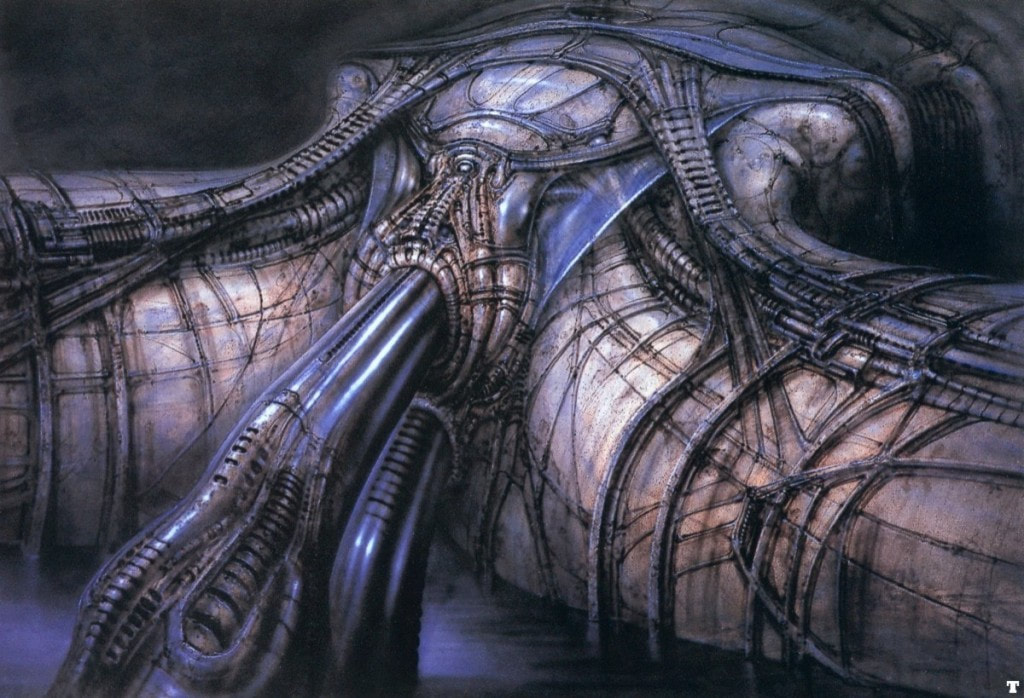
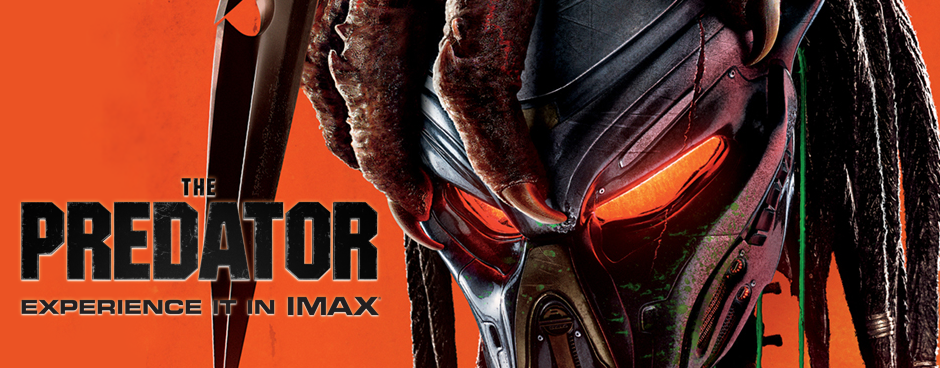
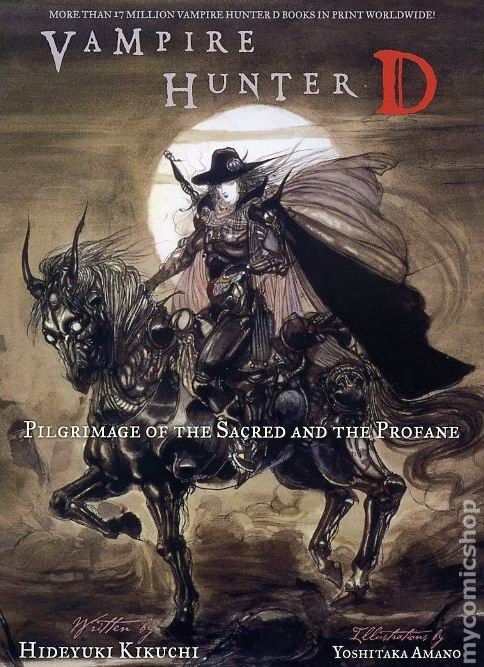
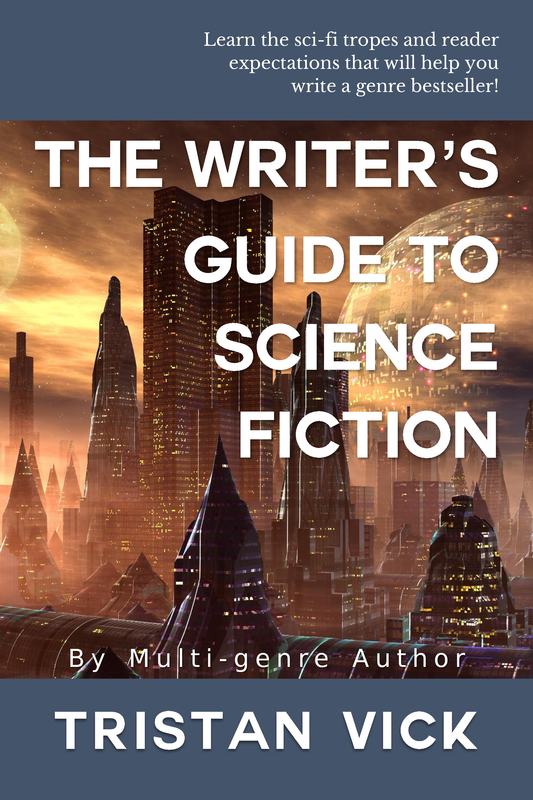
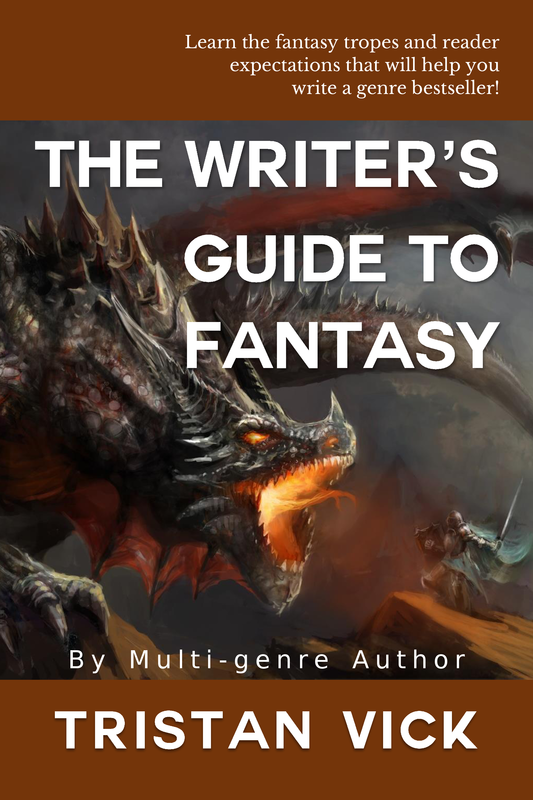
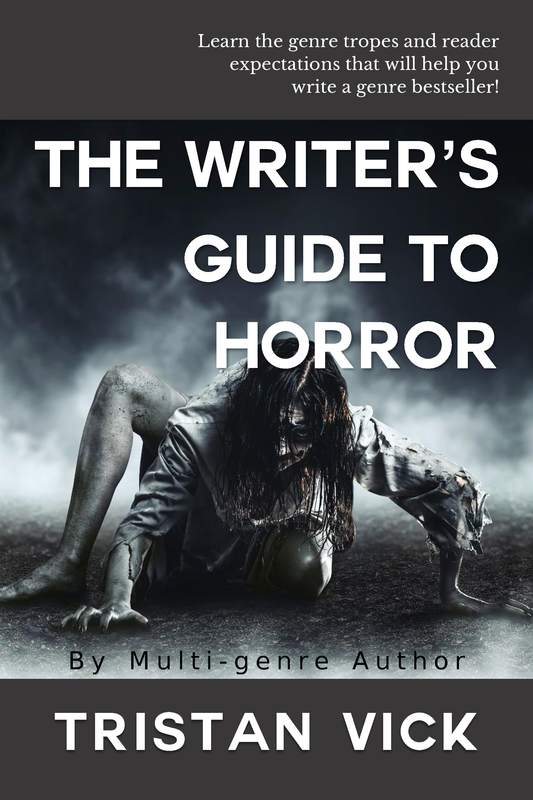
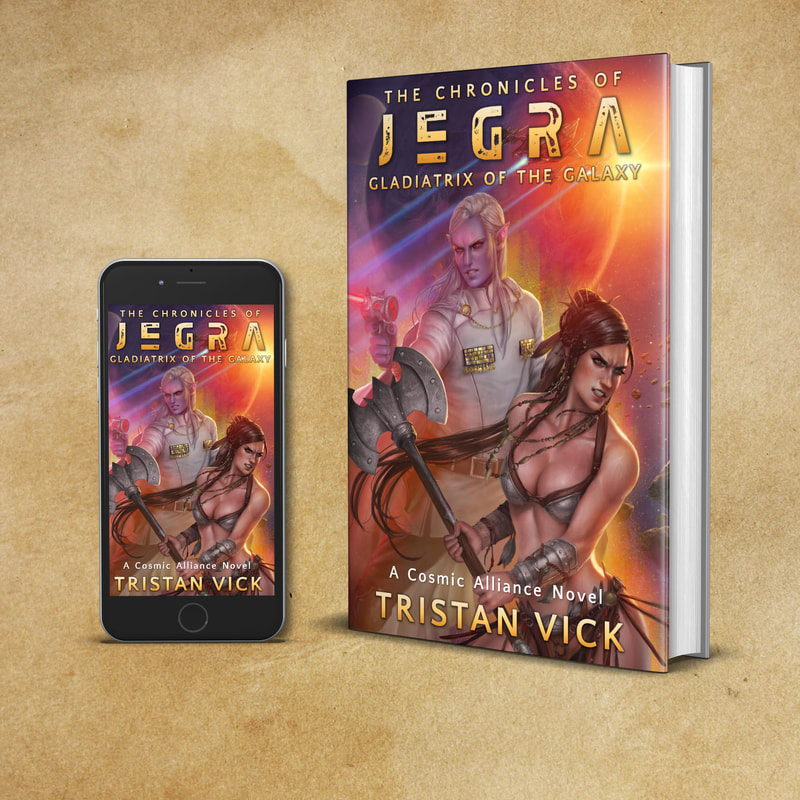
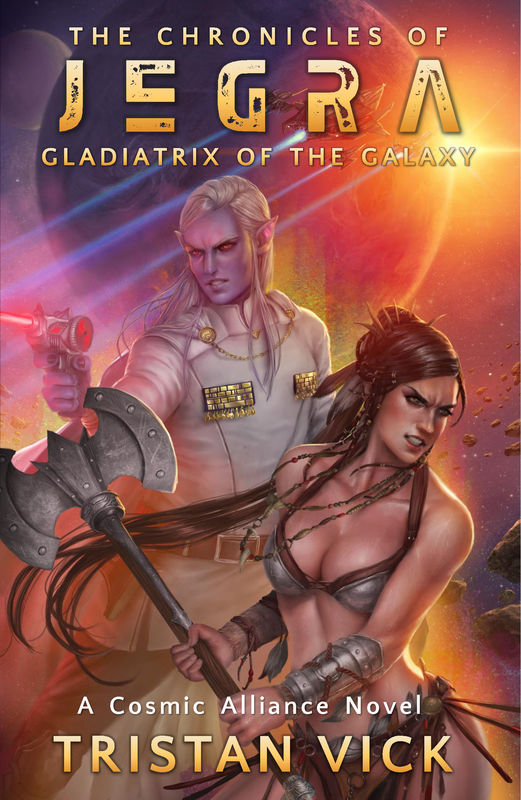
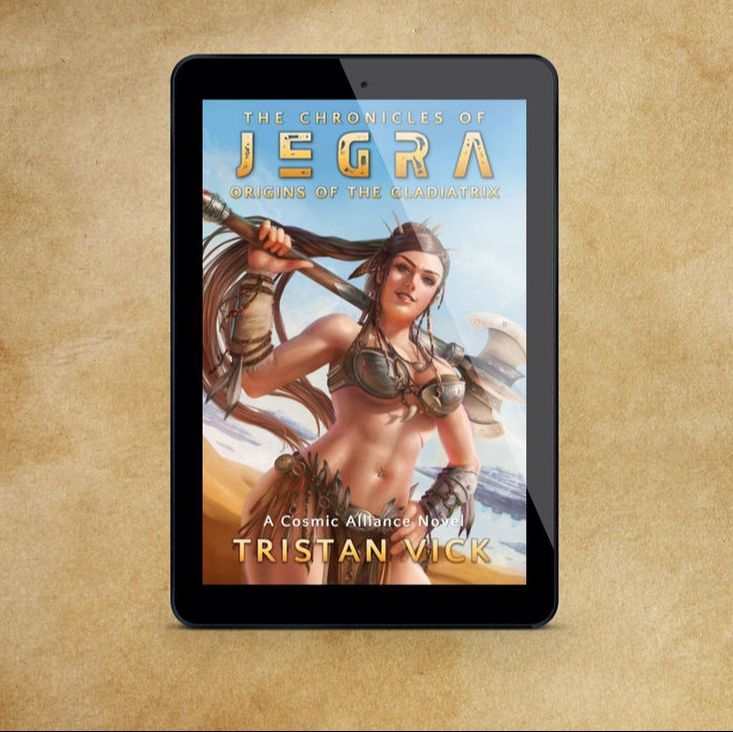
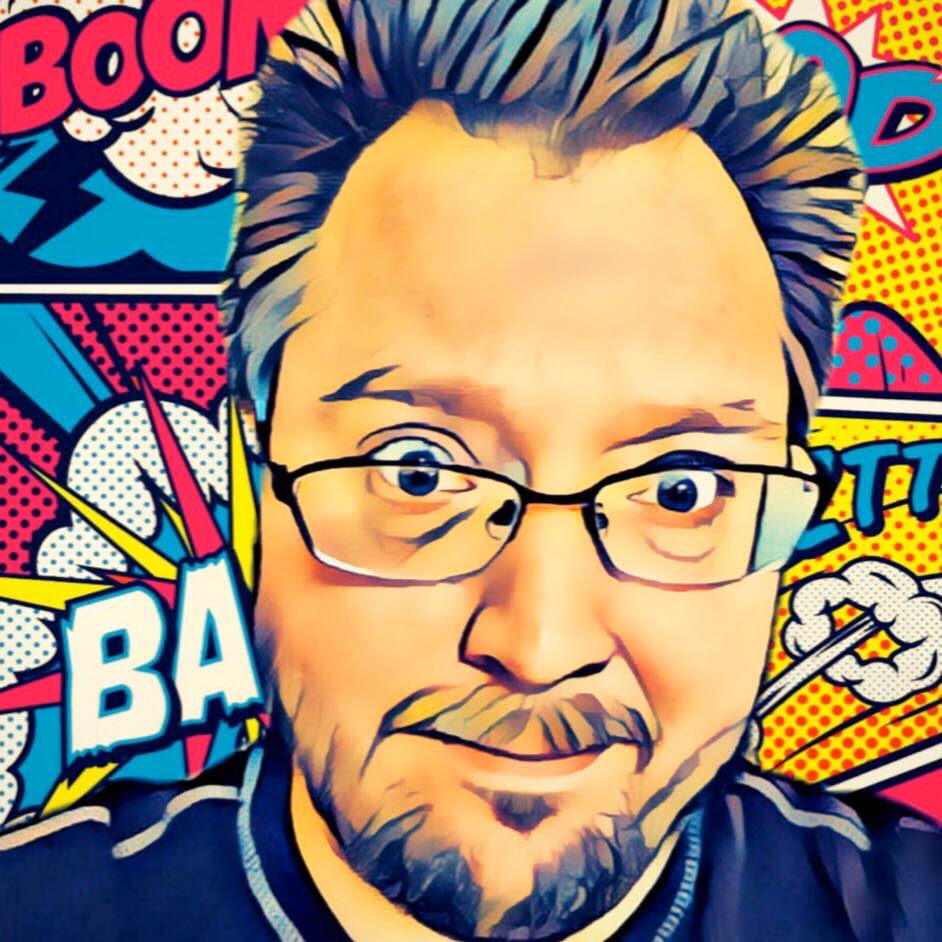
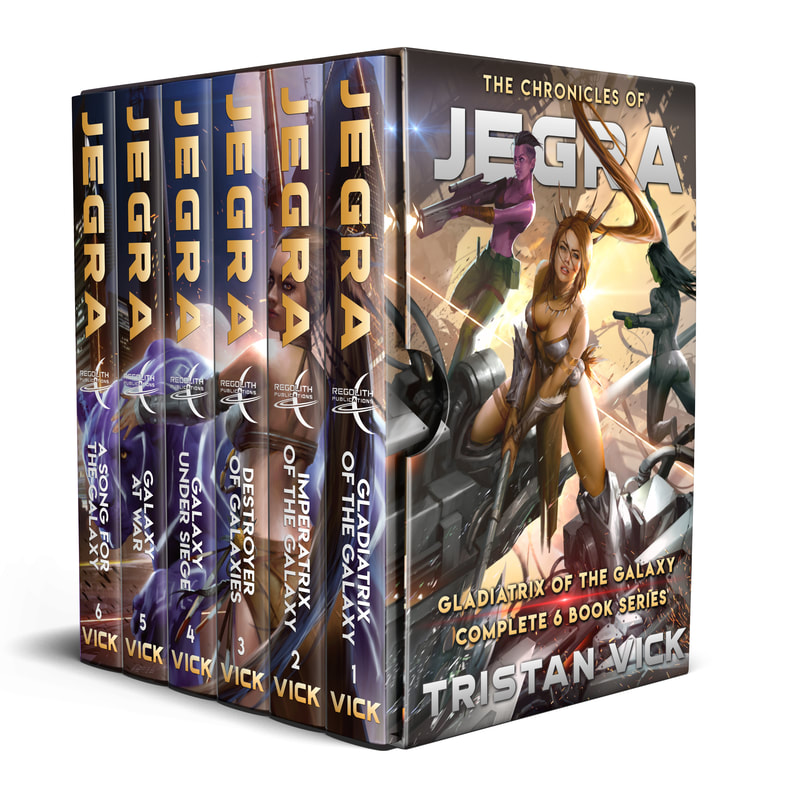
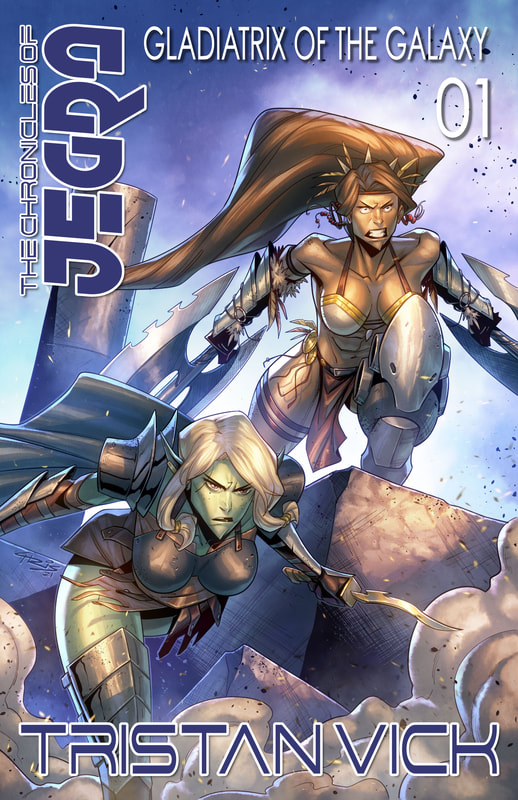
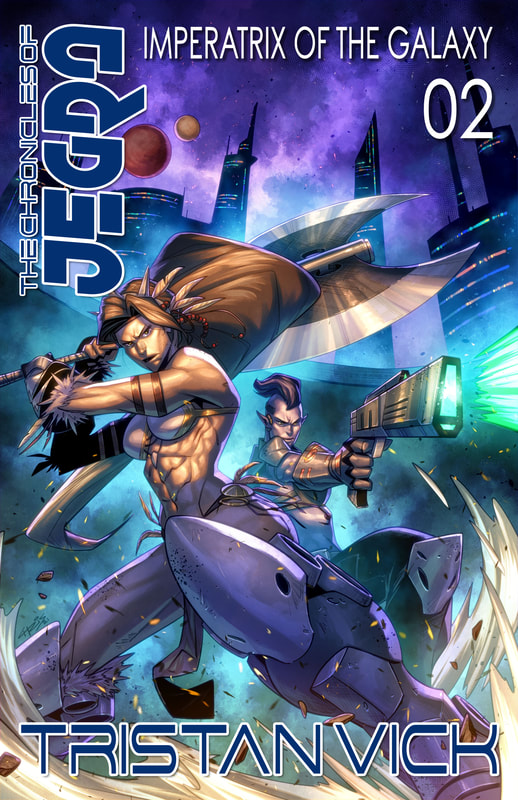
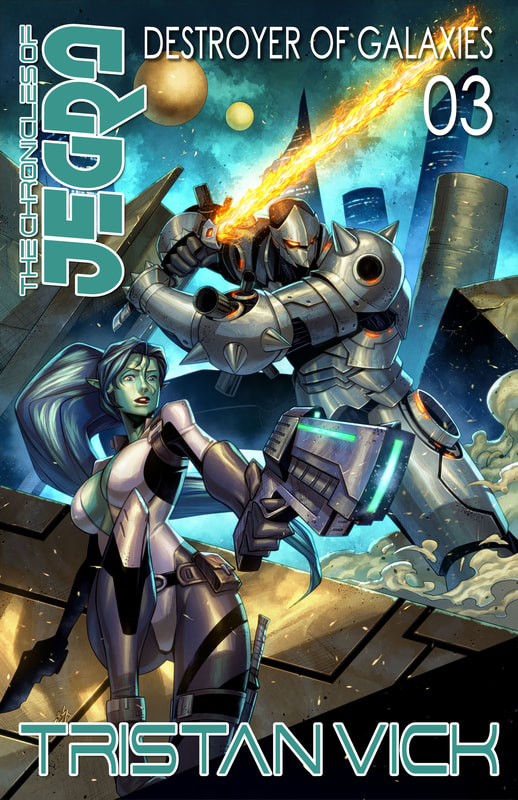
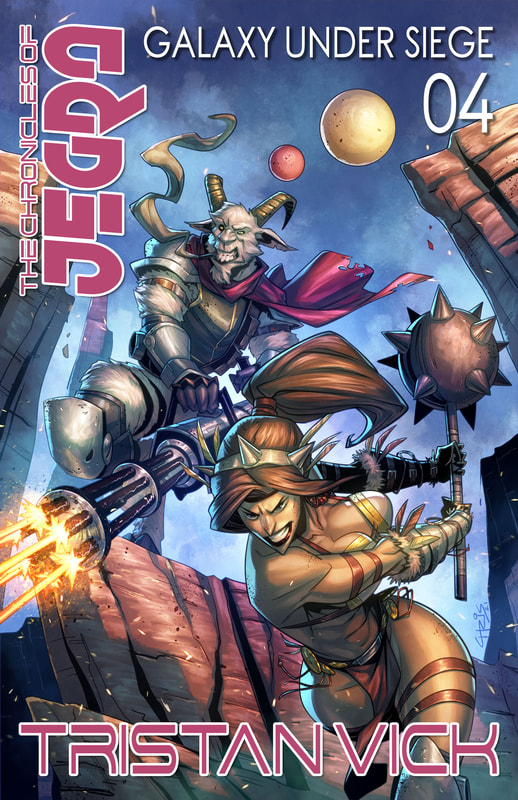
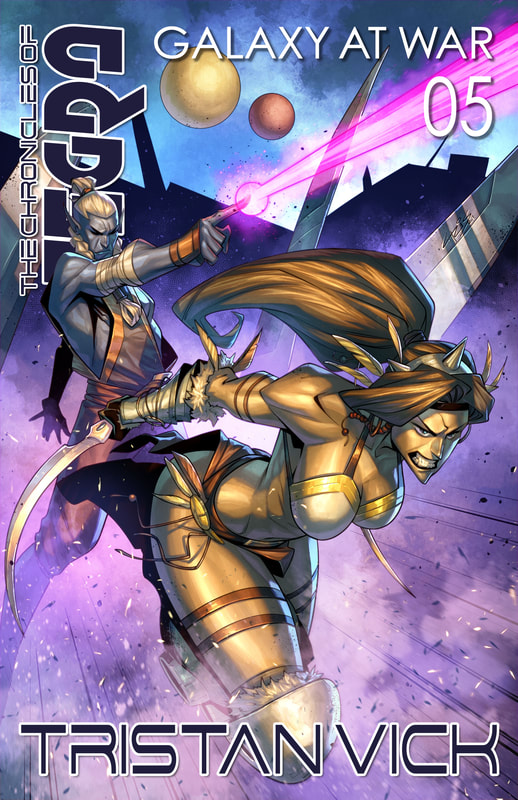
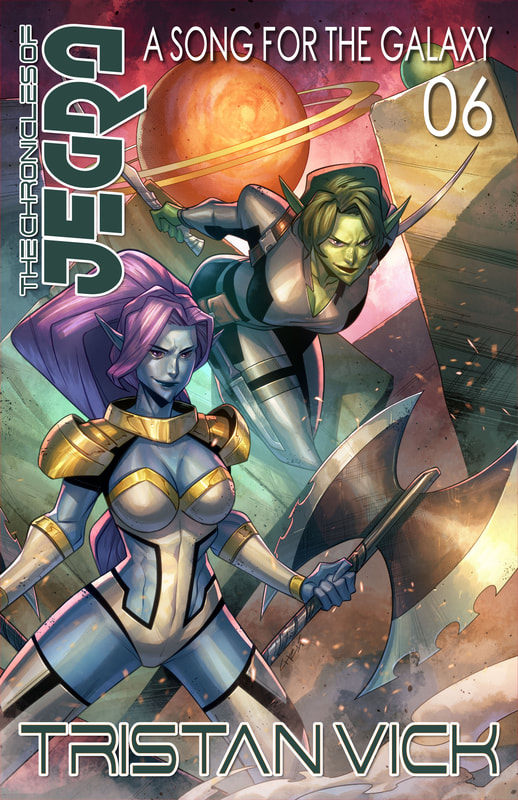
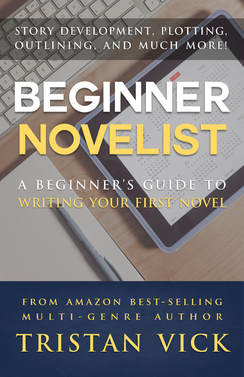
 RSS Feed
RSS Feed
